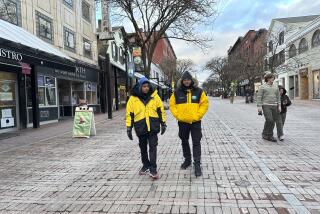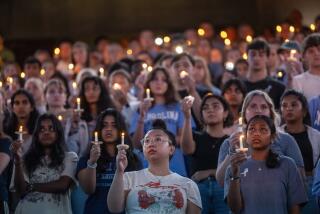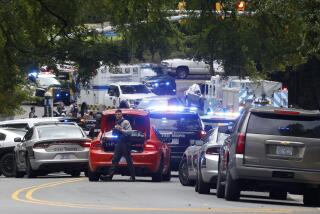Killings Shock Town Unaccustomed to Fear
HANOVER, N.H. — Murder seldom stops to rear its ugly head in this idyllic campus town. Until Saturday, just two homicide cases were recorded here in the last 50 years.
So the slaying of two popular professors in their own home has set Dartmouth College reeling.
“Everyone is wondering . . . why did it happen in quiet Hanover? Why did it happen to two people who were so loved and respected?” Omer Ismail, editor of The Dartmouth student newspaper, said Tuesday.
The shock of losing husband and wife academics Susanne and Half Zantop was compounded by the mystery surrounding their deaths. Police officials and the state attorney general have not said how the Zantops died, nor whether there are any suspects.
“With so little information about the event, that does kind of make it worse,” said professor Dick Birnie, a colleague of Half Zantop’s in the department of earth sciences.
The bodies were discovered Saturday when Roxana Verona, a professor of French and Italian, arrived at the Zantops’ secluded home in nearby Etna for dinner. When she saw the couple on the floor and blood around them, she ran to the home of a neighbor, who summoned police.
Investigators sealed off the Zantops’ home. An autopsy Sunday confirmed that they were homicide victims.
At a news conference Tuesday, New Hampshire Atty. Gen. Philip McLaughlin defended the decision of the 30-person investigation team to release no details on the Zantops’ deaths. He said state law and an imperative to preserve the integrity of the inquiry prohibited him from disclosing how or even when the couple was killed--or what leads police were pursuing.
Over and over, when pressed for specifics, McLaughlin said only: “No.”
The attorney general did say, however, that bloodstains found in a campus dormitory soon after discovery of the bodies were determined to be “irrelevant” to the investigation.
Asked about uneasiness among students and faculty who feared that a killer might be at large, McLaughlin said there should be no more alarm than “in any community where two lovely and respected individuals were murdered, as occurred here.”
The two professors were known for their work in international human rights--and also for their involvement in the university. With 25 years on the Dartmouth faculty, Half Zantop, 62, was a specialist in economic geology--the study of ore deposits’ formation and value. An avid mountaineer, Zantop more than once scaled the face of Yosemite’s Unicorn Peak.
Like her husband, Susanne Zantop, 55, was born in war-torn Germany. A professor of German and comparative literature, she also taught Spanish and women’s studies.
Within the rarefied sphere of Ivy League foreign language professors, “she was the brightest light around,” said Maria M. Tatar, a professor of German at Harvard. “She was just at the top of her career.”
The Zantops had a wide circle of acquaintances, friends said, and their home was a kind of salon, with the doors always open to students and faculty. Both professors also were known for reaching out to people in trouble.
“She just had this energy,” said Bruce Duncan, also a professor of German. “She was always a contributor, in just any way you want to name. If you ever had a guest lecturer, you knew she’d throw the reception or put the person up.”
In some ways, the open-door policy extended beyond the Zantop home. The dormitories that house Dartmouth’s 5,000 undergraduate students are never locked. Many residents of the small village that surrounds the campus say they would never think to bolt their homes or even to lock their cars.
“I leave the keys on the floor of my car so I can find them,” said poet Nardi Campion, who has lived here for decades.
The tranquillity is accompanied by an almost surreal sense of closeness, Campion added.
“Everybody knows everybody,” she said. “Our sense of reality is pretty limited.”
In addressing the tragedy, Dartmouth President James Wright remarked Tuesday that, “obviously, events such as this shatter” the optimism, confidence and security of a campus community.
“Our resolution is to try to deal with that,” said Wright, who for several years was a close neighbor of the Zantops. Wright and his wife opened their residence to students and faculty Monday for a gathering with no speeches, with copious quantities of hugs and tears.
In the wake of the killings, counselors extended their hours to help students, and campus security was beefed up.
But with no police timetable for disclosing further information, “everyone’s kind of on edge,” Birnie said.
More to Read
Sign up for Essential California
The most important California stories and recommendations in your inbox every morning.
You may occasionally receive promotional content from the Los Angeles Times.










